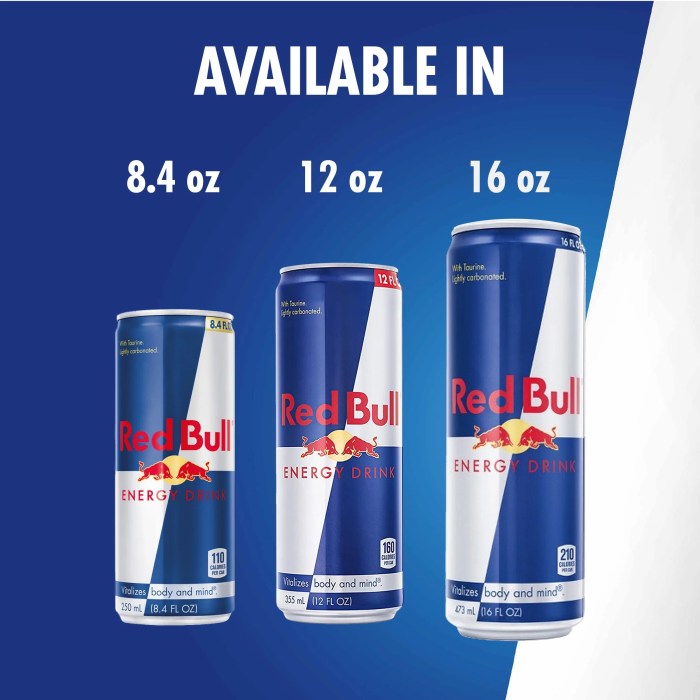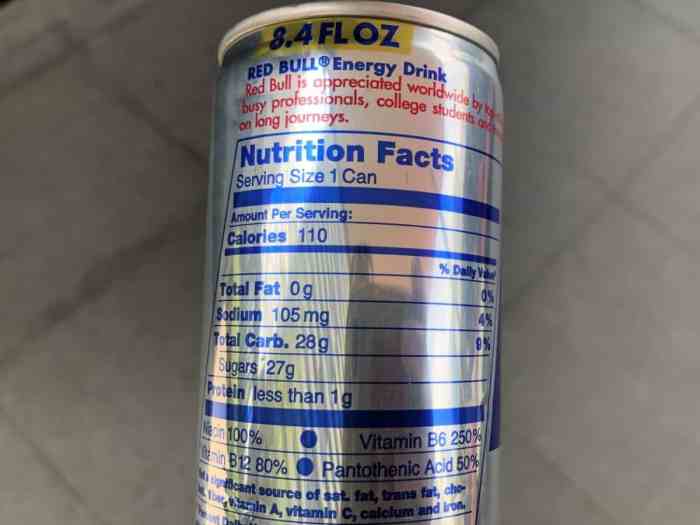
Red Bull Ingredients & Composition

Red bull nutrition facts – Red Bull, a globally recognized energy drink, boasts a specific blend of ingredients contributing to its distinctive taste and purported effects. Understanding these components and their interactions is crucial for informed consumption. This section details the key ingredients, their functions, and a comparison to similar energy drinks.
Red Bull Ingredient Breakdown
Red Bull’s primary ingredients include carbonated water, sucrose (sugar), glucose (another sugar), caffeine, taurine, citric acid, and various flavorings and colorings. Carbonated water provides the fizz and volume. Sucrose and glucose are simple sugars, providing rapid energy. Caffeine, a central nervous system stimulant, increases alertness and reduces fatigue. Taurine, an amino acid, plays a role in various bodily functions, although its specific effects in Red Bull are still under research.
Citric acid adds tartness, balancing the sweetness. The specific flavorings and colorings contribute to Red Bull’s signature taste and appearance. It’s important to note that the exact amounts of each ingredient can vary slightly depending on the specific Red Bull product and region.
Comparison to Similar Energy Drinks, Red bull nutrition facts
The following table compares the ingredient composition of Red Bull to two other popular energy drinks (Competitor A and Competitor B – note: specific brand names are omitted to avoid endorsing particular products, and the values presented are for illustrative purposes and may not reflect exact current formulations). The amounts listed are approximate and can vary.
| Ingredient | Red Bull (per 250ml can – approximate) | Competitor A (per 250ml can – approximate) | Competitor B (per 250ml can – approximate) |
|---|---|---|---|
| Caffeine (mg) | 80 | 70 | 90 |
| Taurine (mg) | 1000 | 400 | 1200 |
| Sugar (g) | 27 | 25 | 30 |
| Citric Acid (g) | Variable, not typically listed | Variable, not typically listed | Variable, not typically listed |
The Role of Caffeine and Taurine
Caffeine and taurine are two key ingredients that significantly contribute to Red Bull’s effects. Caffeine acts as a stimulant, increasing heart rate and blood pressure, enhancing alertness and reducing feelings of tiredness. However, excessive caffeine consumption can lead to anxiety, insomnia, and digestive issues. Taurine, an amino acid naturally occurring in the body, has various functions, including acting as an antioxidant and potentially influencing nerve transmission.
Red Bull, known for its energy boost, contains a significant amount of sugar and caffeine. Comparing this to other carbonated beverages is insightful, and understanding the nutritional profile of similar drinks helps put things into perspective. For instance, checking out the detailed breakdown available at dr pepper nutrition facts offers a useful comparison point. Ultimately, both Red Bull and Dr Pepper highlight the importance of mindful consumption of sugary drinks.
Its specific impact within the context of Red Bull’s formulation is still an area of ongoing research; studies have yielded mixed results regarding its synergistic effect with caffeine. It is important to note that the combined effects of caffeine and taurine are not fully understood.
Alternative Beverages with Similar Benefits: Red Bull Nutrition Facts

Seeking an energy boost without the drawbacks of Red Bull’s high sugar and caffeine content? Several alternatives offer similar benefits with a healthier profile. These options provide a natural energy lift, often incorporating vitamins and antioxidants, without the potential negative side effects associated with high levels of processed sugar and stimulants. Choosing a healthier alternative can contribute to improved overall well-being.
Many individuals look for alternatives to energy drinks due to concerns about the impact of high sugar and caffeine intake on their health. Excessive sugar consumption is linked to weight gain, type 2 diabetes, and heart disease, while high caffeine intake can lead to anxiety, insomnia, and digestive issues. Therefore, understanding the benefits and drawbacks of healthier alternatives is crucial for making informed choices.
Examples of Healthier Alternatives to Red Bull
The following beverages offer a natural energy boost, often with added nutritional benefits, providing a viable alternative to energy drinks high in sugar and caffeine.
- Green Tea: Provides sustained energy through the natural stimulant L-theanine, which promotes alertness without the jitters associated with caffeine. It’s rich in antioxidants, supporting overall health. Drawback: The caffeine content, though lower than Red Bull, can still affect sensitive individuals.
- Matcha: A powdered form of green tea, matcha offers a more concentrated dose of antioxidants and caffeine than regular green tea. It provides a smoother, more sustained energy release compared to Red Bull’s immediate, intense effect. Drawback: Can be more expensive than regular tea.
- Coconut Water: Naturally hydrating and rich in electrolytes, coconut water replenishes fluids and provides a gentle energy boost due to its natural sugars. It’s a low-calorie alternative to sugary drinks. Drawback: May not be suitable for individuals with potassium sensitivities.
- Fruit-Infused Water: Combining water with fresh fruits like berries, lemon, or cucumber provides hydration and natural sweetness without the added sugars and artificial flavors found in many energy drinks. Drawback: Doesn’t provide the same level of sustained energy as other alternatives.
- Smoothies with Natural Sweeteners: Blending fruits, vegetables, and perhaps a small amount of yogurt or nut butter provides vitamins, minerals, and sustained energy. Using natural sweeteners like dates or bananas minimizes added sugar. Drawback: Can be higher in calories than other options depending on ingredients.
FAQ Explained
Is Red Bull addictive?
While not physically addictive like some substances, Red Bull’s caffeine content can lead to psychological dependence, meaning individuals may experience withdrawal symptoms like headaches or fatigue if they abruptly stop consumption.
Can Red Bull cause anxiety?
The high caffeine content in Red Bull can exacerbate anxiety in susceptible individuals. The stimulating effects can trigger or worsen feelings of nervousness and unease.
How does Red Bull affect sleep?
Consuming Red Bull close to bedtime can interfere with sleep due to its caffeine content, potentially leading to insomnia or disrupted sleep patterns.
Are there sugar-free alternatives to Red Bull?
Yes, several energy drink brands offer sugar-free or low-sugar options. However, it’s important to check the ingredient list as some may contain artificial sweeteners.
What are the long-term effects of consuming Red Bull daily?
Daily consumption of Red Bull can increase the risk of various health problems including weight gain, dental issues, cardiovascular problems, and sleep disturbances. Moderation is key.